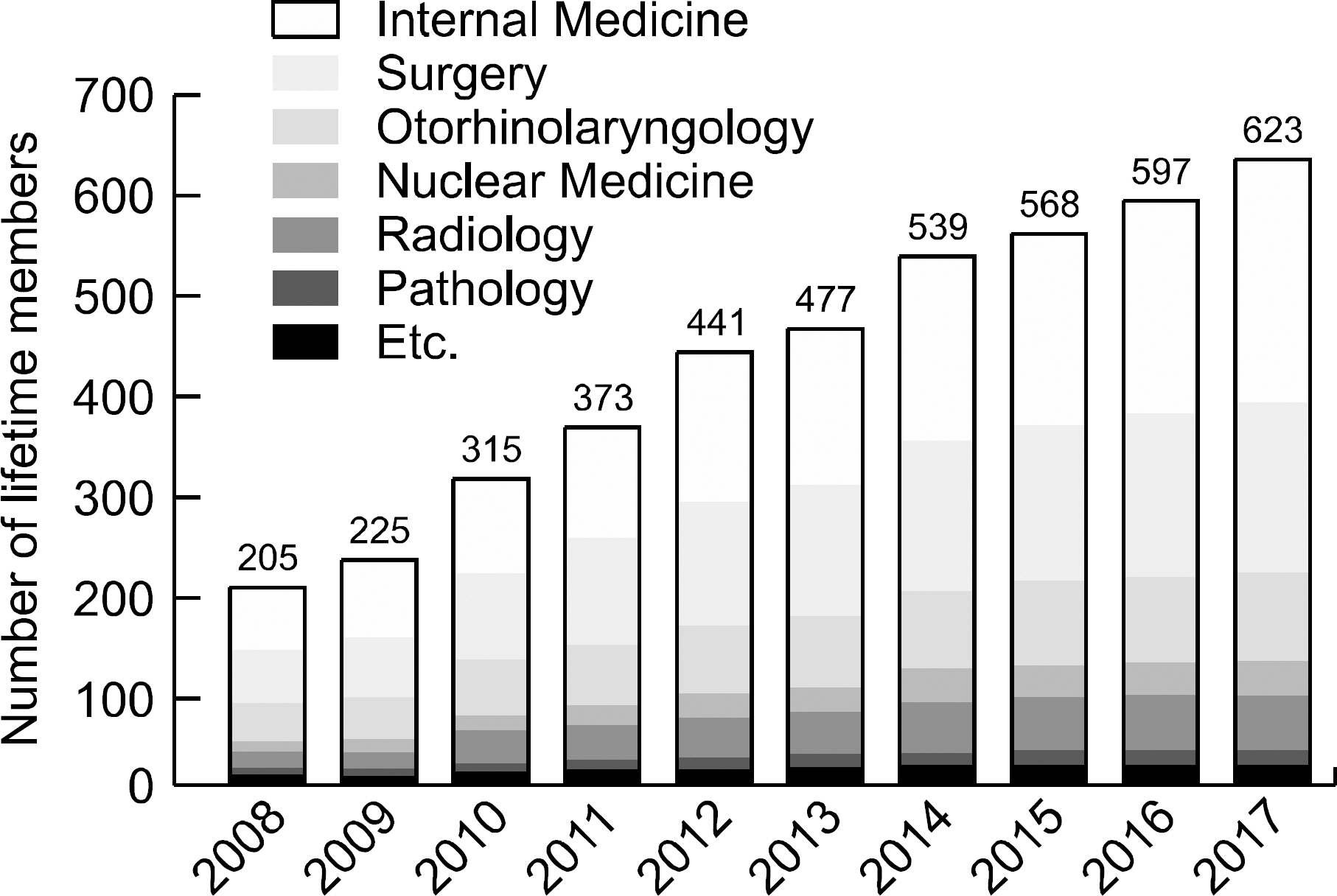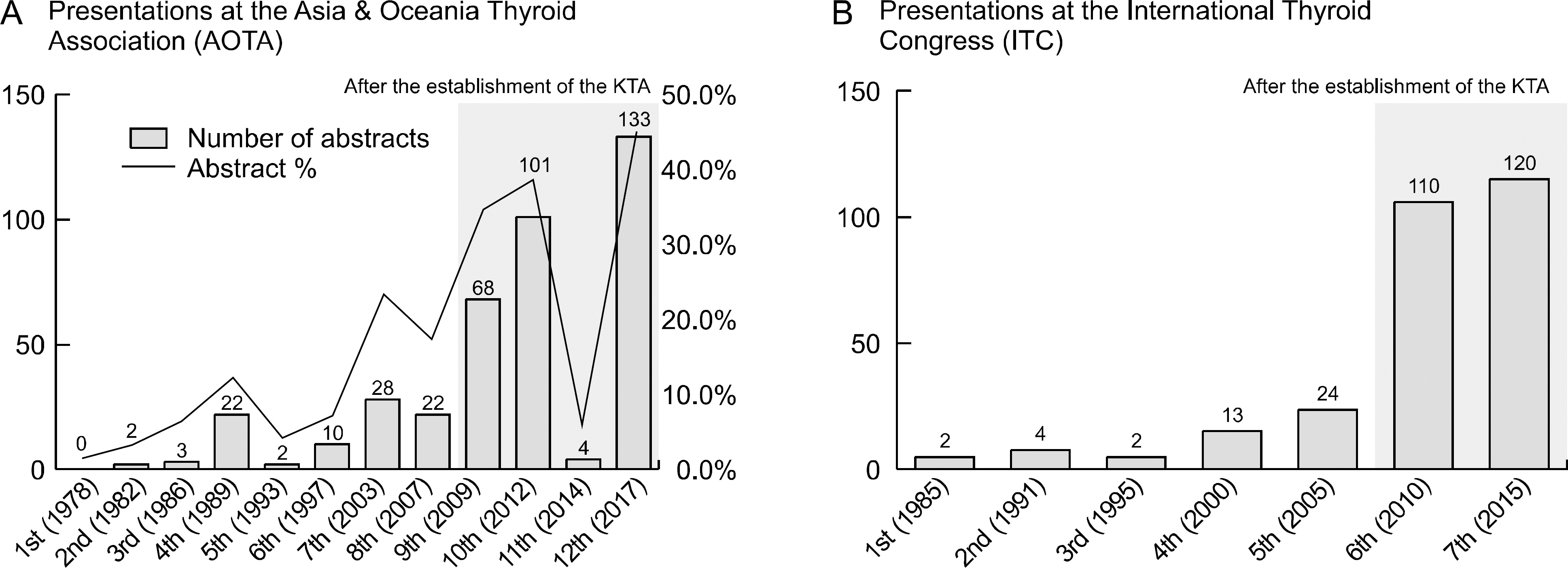Int J Thyroidol.
2018 May;11(1):1-6. 10.11106/ijt.2018.11.1.1.
Ten Years of the Korean Thyroid Association: Achievement and Future
- Affiliations
-
- 1Department of Internal Medicine, Seoul National University College of Medicine, Seoul, Korea. imykh@naver.com
- 2Department of Internal Medicine, Seoul National University Boramae Medical Center, Seoul, Korea.
- KMID: 2428063
- DOI: http://doi.org/10.11106/ijt.2018.11.1.1
Abstract
- The Korean Thyroid Association (KTA) is a multi-disciplinary organization founded by various Korean societies involved in thyroid disease. The KTA has become a foundation stone of the rapid development of the thyroidology in Korea by utilizing the characteristic of multi-discipline for the past 10 years. On February 16, 2008, the inaugural conference was held with great success. Since then, in a short period of 10 years, the number of lifetime members of the KTA reached 623. On March 29, 2012, the KTA became an approved organization by Korean Medical Association within the record time of 4 years after its establishment. In terms of patient care, mutual cooperation among experts in the various fields of thyroid disease have been promoted based on the KTA. On the academic side, the number of papers were awarded and published at international conferences or international academic journals has increased dramatically, and finally, the research on thyroid disease in Korea has reached the global level. The KTA is a multi-disciplinary society consisting of experts from various fields such as internal medicine, surgery, otolaryngology, nuclear medicine, radiology, and pathology. The reason why the KTA has achieved unparalleled growth is that all the KTA members, including senior professors who served as the president and vice president, and incumbent executives, have been harmonized and developed together. Here, we review the activities of the KTA for 10 years from its establishment, and present the future direction of the KTA.
Keyword
MeSH Terms
Figure
Cited by 1 articles
-
Forty Years Together, New Leap Forward! The 40th Anniversary of the Korean Endocrine Society
Jong Chul Won, Ki-Hyun Baek
Endocrinol Metab. 2022;37(6):851-857. doi: 10.3803/EnM.2022.604.
Reference
-
1). Korean Thyroid Association. Korean Thyroid Association 10 Years History. Seoul, Korea: Mincom;2018. p. 82–141.2). Kim WB, Kim TY, Kwon HS, Moon WJ, Lee JB, Choi YS, et al. Management guidelines for patients with thyroid nodules and thyroid cancer. J Korean Endocr Soc. 2007; 22(3):157–87.
Article3). Cooper DS, Doherty GM, Haugen BR, Kloos RT, Lee SL, Mandel SJ, et al. Management guidelines for patients with thyroid nodules and differentiated thyroid cancer. Thyroid. 2006; 16(2):109–42.
Article4). National Comprehensive Cancer Network. Clinical practice guidelines in oncology - Thyroid carcinoma, version 1, 2005. [cited May 9, 2018]. Available from: URL. http://www.nccn.org/professionals/physician_gls/PDF/thyroid.pdf.5). Yi KH, Park YJ, Koong SS, Kim JH, Na DG, Ryu JS, et al. Revised Korean Thyroid Association Management Guidelines for patients with thyroid nodules and thyroid cancer. Endocrinol Metab. 2010; 25(4):270–97.
Article6). Yi KH, Moon JH, Kim IJ, Bom HS, Lee J, Chung WY, et al. The diagnosis and management of hyperthyroidism consensus - report of the Korean Thyroid Association. J Korean Thyroid Assoc. 2013; 6(1):1–11.
Article7). Yi KH, Kim KW, Yim CH, Jung ED, Chung JH, Chung HK, et al. Guidelines for the diagnosis and management of thyroid disease during pregnancy and postpartum. J Korean Thyroid Assoc. 2014; 7(1):7–39.
Article8). Yi KH, Lee EK, Kang HC, Koh Y, Kim SW, Kim IJ, et al. 2016 Revised Korean Thyroid Association Management Guidelines for patients with thyroid nodules and thyroid cancer. Int J Thyroidol. 2016; 9(2):59–126.
Article9). Kang S, Kim BI, Kim IJ, Bom HS, Lee GH, Lee J, et al. Radiation safety in the treatment of patients with thyroid disease by 131I. J Korean Thyroid Assoc. 2012; 5(1):6–14.10). Shin S, Park SE, Kim SY, Hyun MK, Kim SW, Kwon JW, et al. Effectiveness of ultrasonographic screening for thyroid cancer: round-table conference in the National Evidence-based Healthcare Collaborating Agency (NECA) in conjunction with the Korean Thyroid Association. Asian Pac J Cancer Prev. 2014; 15(12):5107–10.
Article11). Yi KH, Kim SY, Kim DH, Kim SW, Na DG, Lee YJ, et al. The Korean guideline for thyroid cancer screening. J Korean Med Assoc. 2015; 58(4):302–12.
Article12). Kim WG, Kim WB, Woo G, Kim H, Cho Y, Kim TY, et al. Thyroid stimulating hormone reference range and prevalence of thyroid dysfunction in the Korean population: Korea National Health and Nutrition Examination Survey 2013 to 2015. Endocrinol Metab. 2017; 32(1):106–14.
Article13). Jeon MJ, Kim WG, Kwon H, Kim M, Park S, Oh HS, et al. Excessive iodine intake and thyrotropin reference interval: data from the Korean National Health and Nutrition Examination Survey. Thyroid. 2017; 27(7):967–72.
Article14). Park SY, Kim HI, Oh HK, Kim TH, Jang HW, Chung JH, et al. Age- and gender-specific reference intervals of TSH and free T4 in an iodine-replete area: data from Korean National Health and Nutrition Examination Survey IV (2013-2015). PLoS One. 2018; 13(2):e0190738.
Article15). Lim HJ, Ahn SH, Hong S, Suh YJ. The relationship between subclinical thyroid disease and cardiovascular disease risk score in Koreans. J Korean Med Sci. 2017; 32(10):1626–32.
Article
- Full Text Links
- Actions
-
Cited
- CITED
-
- Close
- Share
- Similar articles
-
- Ten Years of the Korean Thyroid Association: Achievement and Future: Correction
- Differentiated Thyroid Cancer and Radioactive Iodine: Past, Present and Future
- Vision of Thyroid Surgery: Past, Present and Future
- Recurrent Thyroid Papillary Carcinoma in Children Under Ten Years Old: Report of Two Cases and Literature Review
- History of Korean Thyroid Association and Recent Debates on Diagnosis and Treatment of Thyroid Cancer in Korea




